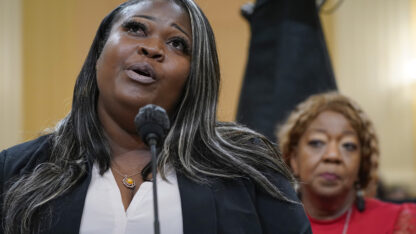Controversial filmmaker and political conspiracist Dinesh D’Souza issued a public apology on his website Sunday after falsely accusing a metro Atlanta resident of voter fraud during the 2020 presidential election.
In 2022, the political commentator released the film “2000 Mules,” which uses phone geolocation data and drop box surveillance footage to purportedly show so-called “mules” trafficking fraudulent ballots. The information provided in the film has since been debunked after various investigations.
During one of the scenes, surveillance videos shows Mark Andrews, with his face blurred, arriving to a Lawrenceville dropbox to deposit several ballots.
As the action appears on screen, D’Souza narrates, “What you are seeing is a crime. These are fraudulent votes.”
Shortly after the film premiered, however, state authorities revealed that Andrews was legally dropping off ballots for himself, his wife and their three adult children.
Andrews soon filed a federal lawsuit against D’Souza and True the Vote, a conservative vote monitoring organization, claiming that he and his family felt “faced threats of violence and live in fear” due to the false accusation.
“They were not only outraged, but also afraid for his safety, the safety of his family, and of professional and legal consequences, even though he knew he had not broken any laws,” the lawsuit said.
“Defendants continue to republish their false narrative at the expense of innocent Americans, including Mr. Andrews and his family, despite their knowledge of its falsity or recklessness with respect to its falsity,” it added.
Now, over two years later, the filmmaker is finally acknowledging what investigators, including the Georgia Secretary of State’s Office, found years ago — that the data and the footage are not connected.
Oh his website, the filmmaker released a full statement on the production of the film, as well as offering a long awaited public apology.
“While all of these individuals’ images were blurred and unrecognizable, one of the individuals has since come forward publicly and has initiated a lawsuit over the use of his blurred image in the film and the book,” D’Souza wrote.
“I owe this individual, Mark Andrews, an apology. I now understand that the surveillance videos used in the film were characterized on the basis of inaccurate information provided to me and my team. If I had known then that the videos were not linked to geolocation data, I would have clarified this and produced and edited the film differently,” he added.
Despite his apology, D’Souza said he is standing behind the basic premise of the film — that there was widespread fraud during the 2020 election.
The accusations made against Andrews was one of several plagued against Georgia of voter fraud during election, with President-elect Donald Trump himself stating that the election in the state was “stolen.”
Salem Media Group, who is also named in Andrews’ 2022 filed lawsuit, released an apology to the Georgia resident in May of this year.
The media’s former publishing group, Regnery, published the documentary, as well as its coinciding book based on the same subject matter.
“It was never our intent that the publication of the 2000 Mules film and book would harm Mr. Andrews. We apologize for the hurt the inclusion of Mr. Andrews’ image in the movie, book, and promotional materials have caused Mr. Andrews and his family,” the statement read. “We have removed the film from Salem’s platforms, and there will be no future distribution of the film or the book by Salem.”
As of now, Andrews’ lawsuit against the respective parties is still pending.
WABE’s Sam Gringlas contributed to this report.









